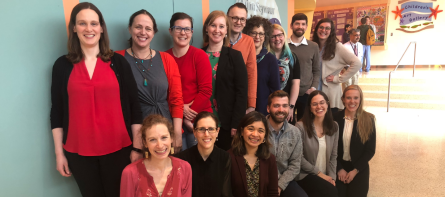Academic General Pediatrics Fellowship Program
Housed in the Division of General Pediatrics and Adolescent Health, the Academic General Pediatrics Fellowship Program is for graduates of Pediatric, Family Medicine, or other primary care residency programs. It is an interdisciplinary research training program in child and adolescent primary care, with the purpose to equip health care professionals with the capacity to conduct primary care research that advances evidence-based practices and policies for creating health equity and improving life trajectory for young people.
Our fellowship prepares individuals for a career in primary care research with skills for conducting determinant, intervention, and health services research focused on current and emerging health and health care issues of children and adolescents. The interdisciplinary training program brings together trainees and faculty from diverse disciplines including Medicine, Public Health, Dentistry, Nursing, Psychology, Nutrition, Social Work, and Education. It is grounded in Divisions with an extensive research and publication record as well as over 40 years of experience in post-graduate fellowship training.
After completing our program, most graduates enter academic positions nationally as clinician researchers.
Curriculum
Accredited by the Academic Pediatric Association, the Academic General Pediatrics Fellowship Program is two to three years in length. Its curriculum integrates educational offerings through the School of Public Health and the School of Nursing with seminars based within the Division of General Pediatrics and Adolescent Health.
The curriculum incorporates general pediatrics knowledge areas, research, advocacy, academic leadership skills, and development of a focal area of expertise. Most fellows spend two half days weekly doing clinical actvities with the remainder of time devoted to fellowship didactics, coursework, and research. Trainees without an MPH or similar degree have the option of completing MPH degrees, choosing from several areas of concentration including Epidemiology, Maternal and Child Heath, Community Health Education, and Public Health Administration and Policy.
Research can be clinical and/or community-based including secondary data analyses, survey-based research, intervention evaluation, qualitative research, etc. Fellows work with identified mentors on primary care research projects in areas of interest. Areas of expertise developed by past trainees include identification and management of psychosocial problems in primary care, advancing health equity among vulnerable youth and under-resourced populations, prevention of adolescent risk behaviors, including violence involvement, bullying, substance abuse, and unsafe sexual activity, overweight prevention and management, primary care for children with chronic conditions, health care for incarcerated youth, and foster care health.
Stipends & Benefits

This page provides access to information on stipends and benefits for medical residents & fellows.
Additionally, each medical fellow receives:
- Funding of the ABP General Pediatrics Certifying Exam
- At least $1,500 for professional development
- At least $300 annually in education funds
- MN medical license, or MN residency permit if ineligible for a MN license
- AAP membership with subspecialty section membership
Prospective Fellows
We appreciate your interest in the University of Minnesota's Academic General Pediatrics Fellowship Program and look forward to reviewing your application. Please feel free to contact the Program Director, Dr. Iris Borowsky (borow004@umn.edu), if you have any questions not answered here on the webpage. Applicants should submit the AGP Fellowship Application including all attachments to the fellowship coordinator.
Please Note:
- Applicants must be Board eligible/Board certified (BE/BC) in Pediatrics, Family Medicine, or Internal Medicine/Pediatrics.
- Our funding source specifies the following: A trainee receiving support from award funds must be a citizen of the United States, a non-citizen national, or a foreign national having in his/her possession a visa permitting permanent residence in the United States.
The University of Minnesota demonstrates a commitment to leveraging the transformative power of equity and diversity to advance excellence in teaching, learning and community engagement. Applications from individuals who self-identify as members of underrepresented groups are particularly welcome.
Contact Us
Fellowship Program Director
Iris Borowsky, MD, PhD
Professor & Divison Director
borow004@umn.edu
Placeholder
Fellowship Coordinator
Jessica Jungman
jungm029@umn.edu
(612) 624-6297
For more information on our other medical fellowship programs, click here.